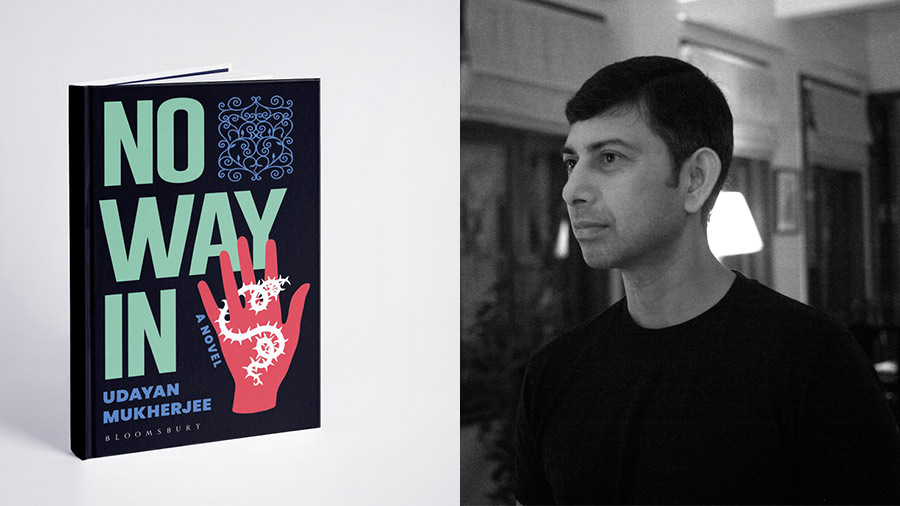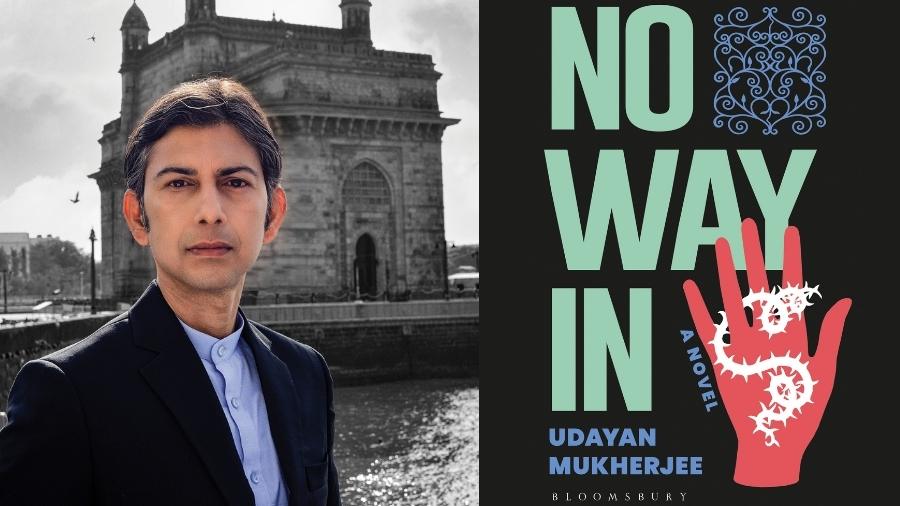Devapriya Roy: You’ve written fiction in multiple genres: literary fiction, short fiction, detective fiction, and now this political novel. What was the specific challenge or challenges that you confronted this time?
Udayan Mukherjee: Many established authors feel that they should stick to one genre. One can see the point of that, as readers do pigeon-hole writers, whether they like it or not. So, some are novelists, some short story writers, some crime fiction specialists while others satirists. It’s how the market works. Only when authors are very successful and established, do they venture out beyond their remit.
But I am hardly a career writer. I have had my little career in broadcasting and that has relieved me of the necessity of having another. Writing, therefore, is a journey of pleasure for me. I don’t care about the rules, nor am I carefully constructing a body of work as an author. I enjoy writing and love to try out new formats. While the novels are very close to my heart, I must confess that I really enjoyed penning the stories for Essential Items. Like I often think of Neville and Shehnaz Wadia, and what they may be up to in Goa now. If this confuses readers, my sincere apologies, but this is how I will be, as long as my books are published. Dabbling in different things, a bit all over the place. Pretty much how I live my life, actually.
Devapriya: This is an urgent, political novel. You’d said that you’d been writing a political novel when the lockdown happened, and you took a break from it to write Essential Items. So how long have you been working on No Way In?
Udayan: I started on No Way In shortly after the release of the Neville Wadia crime novel A Death in the Himalayas, in the winter of 2019. The subject had been on my mind for a while, but after my debut novel Dark Circles, I wanted to take a break from writing another draining, difficult book. My novels are all (sadly) on dark and difficult themes, and they take a bit out of me. The crime novel was a way of refreshing myself before embarking on this new project. And then Covid struck and it got me thinking about those stories, which somehow seemed more urgent at that point of time. My writing journey is a fairly recent one, but I have begun to realise the merits of ‘going back’ to a piece of writing after some time. Often, you see things in a very different light and sometimes the flaws leap out at you. No Way In, in its current, finished form, is indeed quite different from how it began.
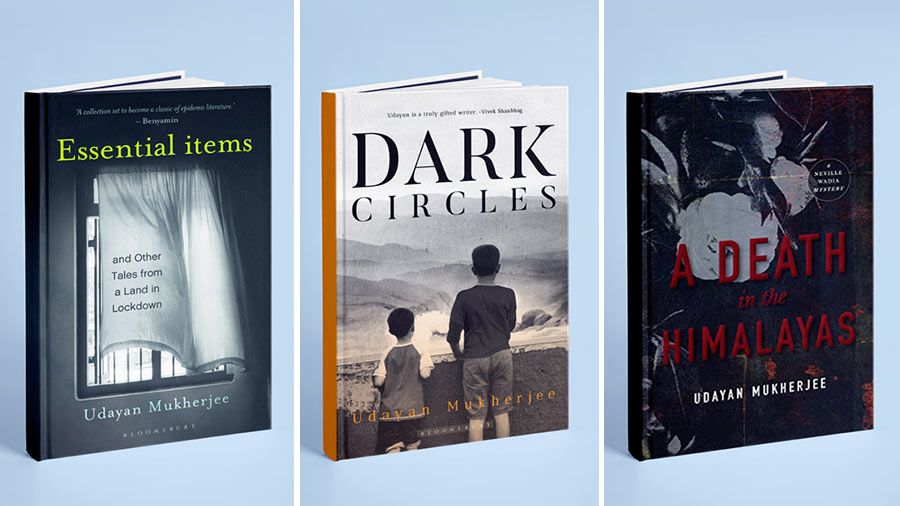
Some books by Udayan Mukherjee: ‘Essential Items’, ‘Dark Circles’ and ‘A Death in the Himalayas’
Devapriya: You have lived in – and written your books in – different places: Mumbai, the Himalayas, London, to name a few. How have these places shaped your writing? No Way In is set almost entirely in Calcutta – but where were you when you wrote it?
Udayan: Yes, I do live all over the place. So, the writing of No Way In began in Colaba (Mumbai), continued in the Himalayas (Uttarakhand) and ended in London, where I reside now. Such an itinerant lifestyle may be unimaginable for most people, indeed freak them out, but I love it. It is the prospect of exploring new places, taking on the challenge of settling in unfamiliar social environments, attempting new things even if they mean courting failure, and meeting new people, that keeps me alive. I hope it comes in handy with the books too, as a certain breadth of experience would seem invaluable in the journey of a writer. So far, my books have all been based in places I have lived in, or know well from long visits. Dark Circles in Delhi and the Himalayas, A Death in the Himalayas obviously in the Uttarakhand mountains, Essential Items in places like Mumbai, Munsiyari, Kolkata and now the new novel in Kolkata, mostly. It is easier to bring characters alive, from milieus one is familiar and comfortable with. Going by that, a Goa crime novel and who knows, maybe even a story based in London, should be next.
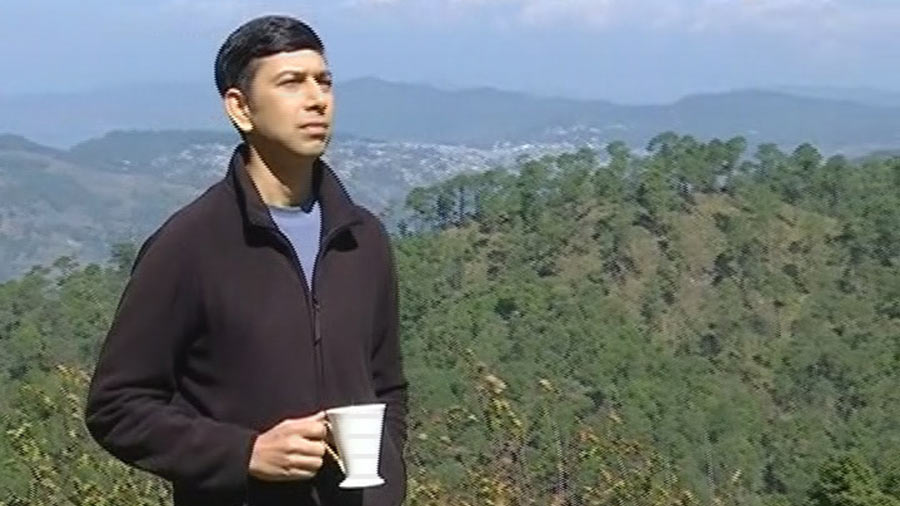
Udayan Mukherjee deriving inspiration from his surroundings in the Himalayas
Devapriya: Did the theme come first or did the characters? Do you remember if there was a specific image, a moment, a sliver of a conversation that led to it? Or was it that what was happening around us in a larger sense birthed the story? Udayan: I would say it was the bigger picture which led me to this novel. The question was how/where to locate it. I was quite sure it would have to be a deeply political novel. Yet, the idea of the home imitating the world outside, or the other way round, was something I wanted to play with. What is unfolding in India today, is only possible because of certain divisions and faultlines which lie at the core of our society; it has only needed an agent to bring it to the surface. Therefore, to locate the story within a traditional Bengali household, at a juncture when sweeping changes are transforming the country’s socio-political landscape, was something I wanted to work with. Equally, the themes of communal violence and migration triggered by it, both such ever present features since Independence, were issues that were important to weave in. In that sense, the macro came first and the micro was invented for the narrative vehicle. But as with most novels, once the first page is written the characters and the story takes over, and themes/ideas only become tools in their hands.
Devapriya: While writing, do you work on the structure with great deliberation, outlining and re-outlining? Or do you stay with the characters and the structure appears intuitively?
Udayan: As a relatively new writer, my preoccupation is primarily with characters and the story I want to tell. That drives me. But, of late, I have begun to appreciate the importance of structure. To be honest, some of it is on account of prodding from experienced editors, who see novels from a different lens. The structure of No Way In too evolved over a period of time, in the way the back story was handled and how the ‘reveals’ were farmed out. Too often, backstories can rob a novel of pace and urgency, and novelists immersed in their narrative can easily lose sight of that. But I am not a technical writer in that sense, and write from the heart. My books may lack the technical sophistication and structural inventiveness of more gifted novelists, but I would like to think they are written with honesty. I don’t know what that implies for the ‘literariness’ quotient of the books, nor do I care, as these are all snobbish constructs which are in the process of being discarded by readers.
Devapriya: You must have conducted a lot of research to bring the world of Saba/ Sabita alive? Will you tell us a bit about that process?
Udayan: Without giving away too much, some research was indeed needed for the backstory involving incidents of serious communal violence in Assam. But a very large part of the book is set within the confines of a home in South Kolkata, and I know that world intimately, having spent the first 20 years of my life there. Not quite in the same circumstances, but enough to know what I am writing about. It is a city I have very mixed feelings about, as well. But writers, and their need for research, vary. Someone like an Amitav Ghosh relies extensively on it, and his research is indeed impeccable. My stories dwell more on the interiority of the characters, and it is what goes on inside their heads that I am most concerned with. The backdrop is important, but only as a scaffolding, to serve the purpose of holding up to the light, the inner lives of the novel’s protagonists.
Devapriya: Tell us about your writing ritual or rituals.Udayan: When I write, I write continuously and obsessively. Quickly too, perhaps faster than I should. I need a window near me, from where I can look out. The Himalayas, or even the Colaba home afforded me this luxury. When the writing is over, I don’t care much for the part that comes after. The lit fests etc which I have done a bit of, but don’t particularly enjoy. They are tamashas, populated mostly by people more interested in celebrity than the books.
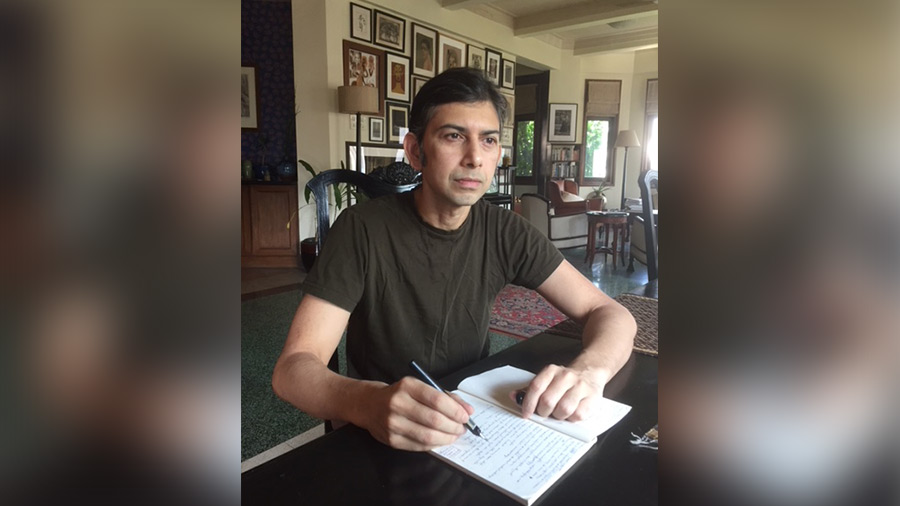
The writer at his Colaba desk (from which he has now moved to London)
Devapriya: You’ve been a journalist for more than two decades. In the new India you’ve written about so powerfully, is the era of journalism as it was completely over? Or is there hope still?
Udayan: There are a few independent outfits – The Wire, Caravan, The Print, Article 14 – which are doing commendable work, not easy in today’s environment. But the state of the mainstream media in India is quite woeful, though publications like The Hindu and The Indian Express are much better than their peers. The less said of TV, the better. Lack of political objectivity, even a basic sense of fairness, and the abysmal quality of reportage and writing, makes Indian journalism today an unedifying spectacle.
Devapriya: Here are some fun questions. To begin with, name a book you wish you’d written.
Udayan: Stoner by John Williams. An astonishing novel about an unremarkable man’s journey through life.
Devapriya: Tell us about a writer you return to again and again.
Udayan: Singling out a perennial favourite is tough. But Graham Greene, James Salter, John Le Carre come to mind.
Devapriya: Will the novel survive the Netflixisation of narrative? Or will novelists be reduced to writing story ideas that clever screenwriters then mine for scripts?
Udayan: I think/hope the novel will survive, but readership may shrink further. The pathetic sales of novels (more so literary) in our own country is a reflection of what is happening. The tuning of the books market to film/video output will grow. It is what it is, one can hardly be judgemental about these trends. Also, the extreme focus on ‘prize lists’ will rob the literary world of genuinely good books which don’t pass muster with a random group of five people on a prize jury. A most unfortunate trend, because it wasn’t always this way.
Devapriya Roy has recently published a collection of short stories, Cat People. She has also penned three novels, co-written a travel-memoir and collaborated on the graphic novel, Indira. She is an alumnus of Presidency College, Calcutta, and Jawaharlal Nehru University, New Delhi. She is currently obsessed with translating Tagore’s Gora into English. She lives in Delhi, and is a Senior Writing Fellow at Ashoka University.
